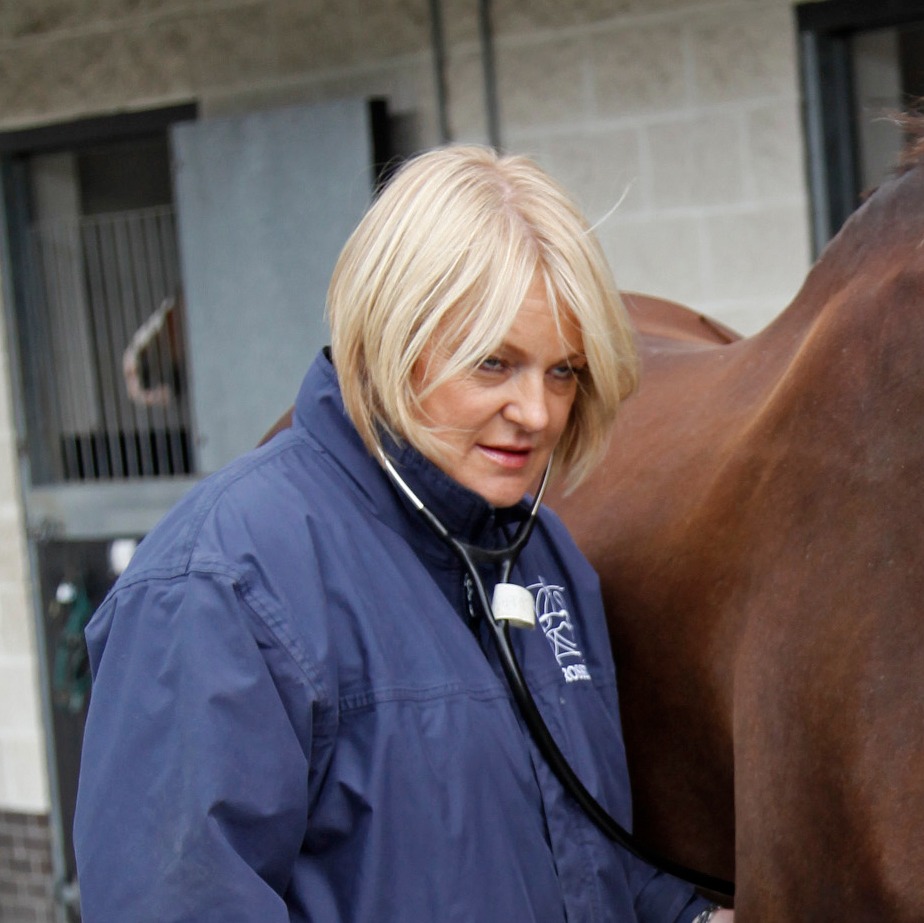Cardiovascular Conditions (Part 1): Impact on Performance & Safety
Species
Equine
Contact Hours
3 Hours
Early Booking Deadline
Thu, 01 January, 1970
Registration Deadline
Thu, 01 January, 1970
Language
English
Discipline
Cardiology
Emergency & Critical Care
Internal Medicine – Endocrinology, Haematology, Infectious Diseases, Parasitology & Oncology
Sports Medicine
Industry Partners
Global

Veterinary Partners
Global


Recorded on: 22nd September 2020
Panelists:
Virginia Reef BA, DVM, DACVIM, DACVSMR – New Bolton Center, University of Pennsylvania, USA
Peter Physick-Sheard BVSc, DipVetSurg, MSc, FRCVS – Guelph University, Canada
Gunther van Loon DVM, PhD, DECEIM, Ass.Member ECVDI – Ghent University, Belgium
Moderator:
Celia Marr BVMS, MVM, PhD, DEIM, DECEIM, FRCVS – Rossdales Equine Hospital, UK
CONTENT DESCRIPTION
Cardiovascular disease is the 3rd most common cause of loss of performance, and lurking beneath the surface, there is always a fear that clinicians might misinterpret a clinical finding which represents a risk factor for exercise-associated collapse or even death. Clients expect their vets to be able to predict the future when a cardiac rhythm disturbance is picked up in pre-purchase exams and that’s a challenge we may – or may not – be able to take on. In this panel discussion, an international group of internists with strong research records and a particular interest in clinical cardiology will get together to drill into these issues, describe evidence where it exists, and talk about the practicalities of managing cases in clinical practice.
1. Atrial Fibrillation Management
- a. Should we confine quinidine sulphate to history?
- b. Does concurrent drug therapy optimise efficacy of transvenous electrical cardioversion and if so, which drugs and which protocols should be used?
2. How can we prevent recurrence of AF?
- a. Does treatment post conversion (antiarrhythmic/antifibrotoic/anti-inflammatory) make a difference?
- b. What drugs/supplements should be avoided?
- c. What other testing should we be doing?
3. What if cardioversion can’t be achieve?
- a. Is the horse still safe to ride?
- b. Why don’t more AF horses drop dead?
4. What’s the significance of exercising arrhythmias?
- a. Who is (and who is not) an informed adult rider/driver?
- b. When are the horse and rider at risk?
- c. What criteria should one look for to trigger strong advice to retire a horse?
5. Sudden death
- a. Can we predict it?
- b. Can we prevent it?
- c. Is there a role for screening athletes for cardiovascular disease, as is commonly done in football?
6. R-on-T – what does it really mean?
- a. Is it always a sign of an unstable rhythm?
- b. Can it be supraventricular in origin?
7. Arrhythmias at the suitability for purchase exam
- a. Atrial premature complexes
- b. Ventricular premature complexes
8. Anti-arrhythmics
- a. Which anti-dysrhythmic will replace quinidine gluconate?
- b. Which anti-dysrhythmic will replace phenytoin?
9. Spontaneous haemoabdomen
- a. What’s the best approach for acute management?
- b. What prognosis should be offered for return to work?
10. Jugular Vein Thrombosis – Unilateral vs. Bilateral
- a. What’s the best approach for acute management?
- b. What prognosis should be offered for return to work?
.
Dr. Virginia Reef, a 1979 graduate of The Ohio State University’s College of Veterinary Medicine, completed a rotating internship in large animal medicine and surgery, and a residency in large animal medicine at the University of Pennsylvania. She became a Diplomate of the American College of Veterinary Internal Medicine. Dr. Reef subsequently became the Director of the Large Animal Cardiology and Ultrasound Service. Shortly thereafter she was instrumental in establishing the Section of Sports Medicine and Imaging at New Bolton Center and has been the Chief of that Section for the past 18 years. Dr. Reef has worked on the faculty at Penn for the past 27 years, advancing through the ranks of assistant, associate, and full professor. She has trained the majority of academics focusing on equine cardiology and ultrasonography in the United States, as well as many individuals in private practice and overseas. Based on her many accomplishments, Dr. Reef was granted a prestigious endowed chair at Penn and currently serves as the Mark Whittier and Lila Griswold Allam Professor of Medicine. She is one of the charter diplomates of the American College of Veterinary Sports Medicine and Rehabilitation and is a large animal associate member of the European College of Veterinary Diagnostic Imaging. In addition to numerous original publications, she is the author and editor of a standard textbook on equine diagnostic imaging, “Equine Diagnostic Ultrasound.”
Gunther van Loon graduated from Ghent University, Belgium, in 1992 and has worked at the Ghent University, Department of Large Animal Internal Medicine, ever since. In 2001 he finished his PhD on “Atrial pacing and experimental atrial fibrillation in equines”. In 2004 he became Diplomate of the European College of Equine Internal Medicine and in 2011 Associate Diplomate of the European College of Veterinary Diagnostic Imaging. He is now Professor in Large Animal Internal Medicine at Ghent University and his major interests are cardiology (arrhythmias, electrophysiology, cardiac pacing, echocardiography, TDI, 2D ST), and thoracic and abdominal ultrasound. Areas of research include 2D Speckle Tracking, Tissue Doppler Imaging, cardiac biomarkers, assessment of arterial wall stiffness and great vessel pathology, atrial fibrillation. Gunther has published mainly in the field of equine internal medicine and cardiology and lectures regularly at national and international courses and conferences.
Celia M Marr graduated from the University of Glasgow in 1985 and her clinical career has focused on Cardiovascular Medicine, Internal Medicine, Intensive Care & Medical Imaging, and she has held positions in the University of Pennsylvania, University of Cambridge and the Royal Veterinary College and worked in racehorse practice in Lambourn. Currently, she is based at Rossdales Equine Hospital and Diagnostic Centre in Newmarket. Celia has published widely on medical disorders of the horse. She is a Diplomate of the European College of Equine Internal Medicine, Fellow of the Royal College of Veterinary Surgeons, Honorary Member of British Equine Veterinary Association, Honorary Professor of the University of Glasgow and Editor-in-Chief of Equine Veterinary Journal..
In 1972 Dr. Physick-Sheard graduated of the University of Bristol School of Veterinary Science. Dr. Physick-Sheard completed his masters in Guelph, and finished his Royal College Fellowship (by thesis). He then trained in Guelph in large animal surgery, and moved to medicine in 1976 to develop large animal cardiology after having spent 2 years in equine practice in southern Ontario. Subsequently, Dr. Physick-Sheard joined the Department of population medicine in 1987 to develop an additional specialty of equine health management. His primary interest in the area of research is with performance horses, specifically cardiovascular contributions to performance, and industry-level (career aggregate) performance.
Veterinary Student
Online Panel Discussion
USD 35.00
Qualified Vet
Online Panel Discussion
USD 85.00
Intern/Resident (Requires proof of status)
Online Panel Discussion
USD 65.00
Vet Nurse/Vet Tech (Requires proof of status)
Online Panel Discussion
USD 65.00
If the options you are looking for are unavailable, please contact us.
No tax will be added unless you are a UK taxpayer
Choose currency at checkout


















